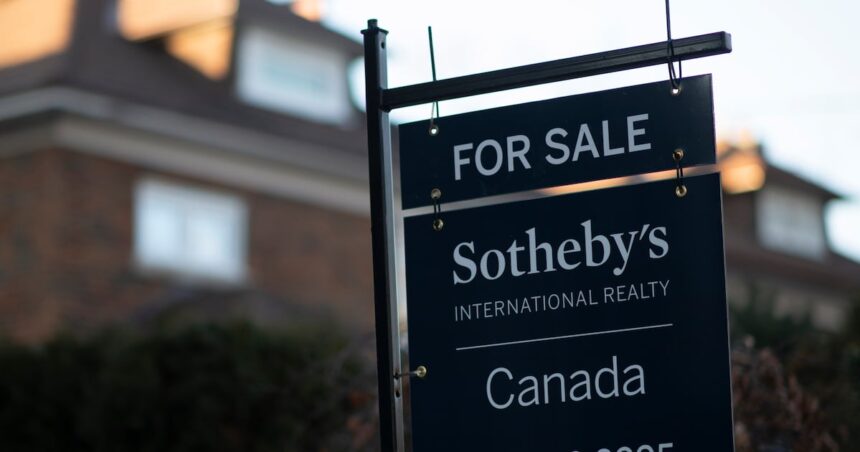The paradox playing out in Toronto’s real estate market right now would confuse even the most seasoned housing analyst. While average homeowners grapple with mortgage renewals at painfully high interest rates, the ultra-luxury segment is experiencing a remarkable renaissance.
Last month’s figures from the Toronto Regional Real Estate Board reveal luxury home sales above $4 million jumped 37% compared to the same period last year. Meanwhile, the broader market continues its erratic pattern of brief rallies followed by extended slumps – what one prominent broker described to me as “chaos becoming the new normal.”
This bifurcation tells a larger story about wealth inequality and investment patterns that’s reshaping Toronto’s housing landscape in ways that could permanently alter the city’s character.
“We’re essentially operating in two completely different markets now,” explains Deborah Wylde, chief economist at Canadian Housing Analytics. “The majority of Torontonians face genuine affordability challenges, while the luxury segment operates by entirely different rules.”
The numbers paint a stark picture. While overall home sales in the GTA declined 3.2% in June compared to 2024, properties priced above $4 million saw 48 transactions – the highest June total ever recorded in this category. The average luxury home now sells within 22 days, down from 36 days last year.
What’s driving this high-end surge? Several factors converge to explain the phenomenon.
First, despite Bank of Canada’s recent rate cuts, global economic uncertainty has wealthy investors seeking stable assets. Canadian real estate, particularly in Toronto, maintains its reputation as a safe harbor during turbulent times. The federal government’s recent adjustments to capital gains taxation have also motivated some investors to accelerate purchases before the new rules fully impact the market.
“Ultra-high-net-worth individuals view Toronto luxury real estate as both a lifestyle purchase and portfolio diversification,” notes Samantha Chen, portfolio manager at Wealth Strategies Group. “The recent volatility in tech stocks and concerns about inflation have redirected significant capital into tangible assets.”
International buyers have returned in force as well. After a temporary retreat during pandemic border restrictions, foreign investment in GTA luxury properties has rebounded dramatically. Data from Statistics Canada shows overseas capital flowing into Ontario residential real estate increased 41% year-over-year, with a significant portion concentrated in the GTA’s premium neighborhoods.
Forest Hill, Rosedale, and Bridle Path – Toronto’s traditional luxury enclaves – have all seen multiple eight-figure transactions in 2025. But perhaps more telling is the emergence of new luxury hotspots in previously mid-market areas.
“We’re seeing properties trading above $4 million in neighborhoods that would never have supported those values five years ago,” says Martin Kovacs, who specializes in luxury properties with Prestige Realty Group. “Areas like Leslieville and Junction have properties now breaching luxury thresholds, which completely transforms the socioeconomic makeup of these communities.”
This transformation raises legitimate concerns about displacement and community cohesion. When I visited Leslieville last week, the contrast was impossible to miss – new ultra-modern homes towering beside modest century-old properties, with local businesses increasingly catering to a wealthier demographic.
Community advocate Jasmine Rodriguez from the Housing Accessibility Network points to troubling consequences: “When neighborhoods undergo rapid upscaling, we lose economic diversity and the very character that made these areas desirable in the first place. The fabric of communities frays when housing becomes purely investment-driven.”
The technology sector bears significant responsibility for this luxury surge. Despite recent layoffs at some tech firms, Toronto’s position as North America’s third-largest tech hub continues to generate tremendous wealth for executives and early employees. The recent IPOs of three Toronto-based tech companies have created dozens of new multimillionaires seeking appropriate housing.
“Tech wealth operates differently than traditional sources of affluence,” explains urban economist Carlos Mendes. “These buyers often prioritize design and technological integration over established prestige addresses. They’re reshaping what luxury means in Toronto real estate.”
The contradiction between luxury strength and broader market uncertainty creates planning challenges for developers and policymakers alike. New luxury developments announced this spring include a $1.2 billion ultra-premium waterfront project and three boutique mid-rise buildings in Yorkville with starting prices above $3 million.
Meanwhile, construction of mid-market housing continues to lag behind population growth. Canada Mortgage and Housing Corporation data indicates a 12% year-over-year decline in housing starts for units priced in the middle third of the market.
The Bank of Canada’s cautious approach to interest rate cuts compounds the divergence. While luxury buyers typically have substantial equity or cash positions, the average Toronto homeowner faces significantly higher monthly payments when renewing mortgages, even with recent modest rate reductions.
“Current monetary policy inadvertently advantages wealthy buyers while prolonging challenges for the middle market,” says financial analyst Priya Singh. “The rate environment essentially functions as a wealth filter determining who can enter or remain in homeownership.”
Looking ahead, market observers offer mixed predictions. Some believe the luxury surge represents a temporary phenomenon driven by unique economic conditions and pent-up demand. Others see it as part of a fundamental restructuring of urban real estate markets across North America.
What seems increasingly clear is that Toronto’s housing future will likely feature even greater stratification between segments. The city that once prided itself on mixed-income neighborhoods may increasingly resemble the stark divisions seen in cities like San Francisco and New York.
For potential buyers and sellers navigating this complex landscape, expert advice centers on understanding your market segment specifically rather than following general housing trends.
As Toronto continues reinventing itself through this period of transformation, the question remains whether policy interventions can preserve some measure of housing accessibility across income levels, or if market forces will cement the current trajectory of luxury growth and middle-market constraint.
The answer will shape not just property values, but the fundamental character of Canada’s largest metropolitan area for generations to come.






